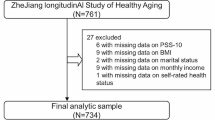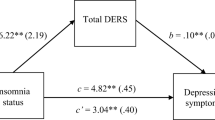Abstract
Perceived stress is strongly associated with sleep problems. Despite the evidence linking these variables, research examining the reciprocal relationships between them using non-recursive models, which include feedback loop between endogenous variables, is lacking. The main objective was to analyse if there is a bidirectional relation between perceived stress and insomnia symptoms with a model using coping and quality of life as predictors of both variables. This is a cross-sectional study with a sample of 987 adults with insomnia symptoms (M = 40.90 years old; SD = 17.17). An exploratory Canonical Correlation Analysis assessed the interrelationships between a set of perceived stress and insomnia symptoms and a set of coping and quality of life variables. Structural Equation Modelling was used to explore the bidirectional relationships between perceived stress and insomnia symptoms, using coping strategies and quality of life as covariates. The first correlation (0.562), dominated by perceived stress, suggested a direct association with insomnia symptoms. The second correlation (0.146), dominated by insomnia symptoms, suggested a reverse association with perceived stress. The model showed good model fit indices (χ2(6) = 4.505, GFI = 0.999; RMSEA = 0.000 [CI 90% 0.000–0.035]). Self-blame, positive reframing, denial, self-distraction, social relationships, and environment were significant predictors of perceived stress; Denial and environment significantly predicted insomnia symptoms. Regarding the bidirectional relationship only perceived stress was a predictor of insomnia symptoms (β = 0.42, p ≤ 0.001). Insomnia symptoms depend on perceived stress, but no evidence of the direct effect of insomnia symptoms on perceived stress was observed. Although the bidirectional relationship has not been confirmed, this study supports the role of perceived stress in the management of insomnia symptoms.


Similar content being viewed by others
References
Irish LA, Kline CE, Gunn HE, Buysse DJ, Hall MH. The role of sleep hygiene in promoting public health: a review of empirical evidence. Sleep Med Rev. 2015;22:23–36.
Roth T, Jaeger S, Jin R, Kalsekar A, Stang PE, Kessler RC. Sleep problems, comorbid mental disorders, and role functioning in the national comorbidity survey replication. Biol Psychiatry. 2006;60:1364–71.
Harvey AG, Buysse DJ. Treating sleep problems: a transdiagnostic approach. New York: Guilford Publications; 2017.
Roth T. Insomnia: definition, prevalence, etiology, and consequences. J Clin Sleep Med. 2007;3(5 Suppl):S7.
Cardoso J, Almeida T, Ramos C, Sousa S. Relationship between childhood trauma and sleep disturbances: the role of perceived stress as a mediator. J Agress Maltreat Trauma. 2018;27:1075–89.
Abe Y, Mishima K, Kaneita Y, Li L, Ohida T, Nishikawa T, Uchiyama M. Stress coping behaviors and sleep hygiene practices in a sample of Japanese adults with insomnia. Sleep Biol Rhythms. 2011;9:35–45.
Gau FY, Chen XP, Wu HY, Lin ML, Chao YF. Sleep-related predictors of quality of life in the elderly versus younger heart failure patients: a questionnaire survey. Int J Nurs Stud. 2011;48:419–28.
Liu X, Liu C, Tian X, Zou G, Li G, Kong L, Li P. Associations of perceived stress, resilience and social support with sleep disturbance among community-dwelling adults. Stress Health. 2016;32:578–86.
Palesh OG, Collie K, Batiuchok D, Tilston J, Koopman C, Perlis ML, Butler LD, Carlson R, Spiegel D. A longitudinal study of depression, pain, and stress as predictors of sleep disturbance among women with metastatic breast cancer. Biol Psychol. 2007;75:37–44.
Floam S, Simpson N, Nemeth E, Scott-Sutherland J, Gautam S, Haack M. Sleep characteristics as predictor variables of stress systems markers in insomnia disorder. J Sleep Res. 2015;24:296–304.
Barber LK, Munz DC. Consistent-sufficient sleep predicts improvements in self-regulatory performance and psychological strain. Stress Health. 2011;27:314–24.
Hagger MS. Sleep, self-regulation, self-control and health. Stress Health. 2010;26:181–5.
Hirotsu C, Tufik S, Andersen ML. Interactions between sleep, stress, and metabolism: from physiological to pathological conditions. Sleep Sci. 2015;8:143–52.
Meerlo P, Sgoifo A, Suchecki D. Restricted and disrupted sleep: effects on autonomic function, neuroendocrine stress systems and stress responsivity. Sleep Med Rev. 2008;12:197–21010.
Garde AH, Albertsen K, Persson R, Hansen ÅM, Rugulies R. Bi-directional associations between psychological arousal, cortisol, and sleep. Behav Sleep Med. 2012;10:28–40.
Zeiders KH, Doane LD, Adam EK. Reciprocal relations between objectively measured sleep patterns and diurnal cortisol rhythms in late adolescence. J Adolesc Health. 2011;48:566–71.
Van Laethem M, Beckers DG, Kompier MA, Kecklund G, van den Bossche SN, Geurts SA. Bidirectional relations between work-related stress, sleep quality and perseverative cognition. J Psychosom Res. 2015;79:391–8.
Pillai V, Roth T, Mullins HM, Drake CL. Moderators and mediators of the relationship between stress and insomnia: stressor chronicity, cognitive intrusion, and coping. Sleep. 2014;37:1199–208.
American Psychiatric Association. Diagnostic and statistical manual of mental disorders. 5th ed. Washington: American Psychiatric Association; 2013.
World Medical Association Inc. Declaration of Helsinki. Ethical principles for medical research involving human subjects. J Indian Med Assoc. 2009;1076:403–5.
Allen Gomes A, Ruivo Marques D, Meia-Via AM, Meia-Via M, Tavares J, Fernandes da Silva C, Pinto de Azevedo MH. Basic scale on insomnia complaints and quality of sleep (BaSIQS): reliability, initial validity and normative scores in higher education students. Chronobiol Int. 2015;32:428–40.
Cohen S, Kamarck T, Mermelstein R. A global measure of perceived stress. J Health Soc Behav. 1983;24:385–96.
Trigo M, Canudo N, Branco F, Silva D. Estudo das propriedades psicométricas da Perceived Stress Scale (PSS) na população portuguesa. Psychologica. 2010;53:353–78.
Carver CS. You want to measure coping but your protocol’too long: consider the brief cope. Int J Behav Med. 1997;4:92–100.
Ribeiro JL, Rodrigues AP. Questões acerca do coping: a propósito do estudo de adaptação do Brief Cope. Psicologia, Saúde & Doenças. 2004;5:3–15.
Whoqol Group. Development of the World Health Organization WHOQOL-BREF quality of life assessment. Psychol Med. 1998;28:551–8.
Vaz Serra A, Canavarro MC, Simões M, Pereira M, Gameiro S, Quartilho MJ, Rijo D, Carona C, Paredes T. Estudos psicométricos do instrumento de avaliação da qualidade de vida da Organização Mundial de Saúde (WHOQOL-Bref) para Português de Portugal. Rev Psiquiatr Clín. 2006;27:41–9.
Khine MS, editor. Application of structural equation modeling in educational research and practice. Rotterdam: Sense Publishers; 2013.
Taylor DJ, Bramoweth AD, Grieser EA, Tatum JI, Roane BM. Epidemiology of insomnia in college students: relationship with mental health, quality of life, and substance use difficulties. Behav Ther. 2013;44(3):339–48.
Morin CM, Rodrigue S, Ivers H. Role of stress, arousal, and coping skills in primary insomnia. Psychosom Med. 2003;65:259–67.
Palagini L, Mauri M, Faraguna U, Carli L, Tani C, Dell’Osso L, Mosca M, Riemann D. Insomnia symptoms, perceived stress and coping strategies in patients with systemic lupus erythematosus. Lupus. 2016;25:988–96.
Zhang Y, Peters A, Chen G. Perceived stress mediates the associations between sleep quality and symptoms of anxiety and depression among college nursing students. Int J Nurs Educ Scholarsh. 2018;15:1–9.
Otsuka Y, Kaneita Y, Itani O, Nakagome S, Jike M, Ohida T. Relationship between stress coping and sleep disorders among the general Japanese population: a nationwide representative survey. Sleep Med. 2017;37:38–45.
Thomas KS, Bower J, Hoyt MA, Sepah S. Disrupted sleep in breast and prostate cancer patients undergoing radiation therapy: the role of coping processes. Psychooncology. 2010;19:767–76.
LeBlanc M, Beaulieu-Bonneau S, Mérette C, Savard J, Ivers H, Morin CM. Psychological and health-related quality of life factors associated with insomnia in a population-based sample. J Psychosom Res. 2007;63:157–66.
Marques DR, Meia-Via AM, da Silva CF, Gomes AA. Associations between sleep quality and domains of quality of life in a non-clinical sample: results from higher education students. Sleep Health. 2017;3:348–56.
Author information
Authors and Affiliations
Corresponding author
Ethics declarations
Conflict of interest
The authors have no conflict of interest to declare.
Ethical approval
All procedures were performed in accordance with the ethical standards of the institutional research committee and with the 1964 Helsinki Declaration and its later amendments.
Informed consent
Informed consent was obtained from all individual participants included in the study.
Additional information
Publisher's Note
Springer Nature remains neutral with regard to jurisdictional claims in published maps and institutional affiliations.
Rights and permissions
About this article
Cite this article
Cardoso, J., Almeida, T.C., Ramos, C. et al. Bidirectional relationship between perceived stress and insomnia symptoms: the role of coping and quality of life. Sleep Biol. Rhythms 19, 23–31 (2021). https://doi.org/10.1007/s41105-020-00284-8
Received:
Accepted:
Published:
Issue Date:
DOI: https://doi.org/10.1007/s41105-020-00284-8




